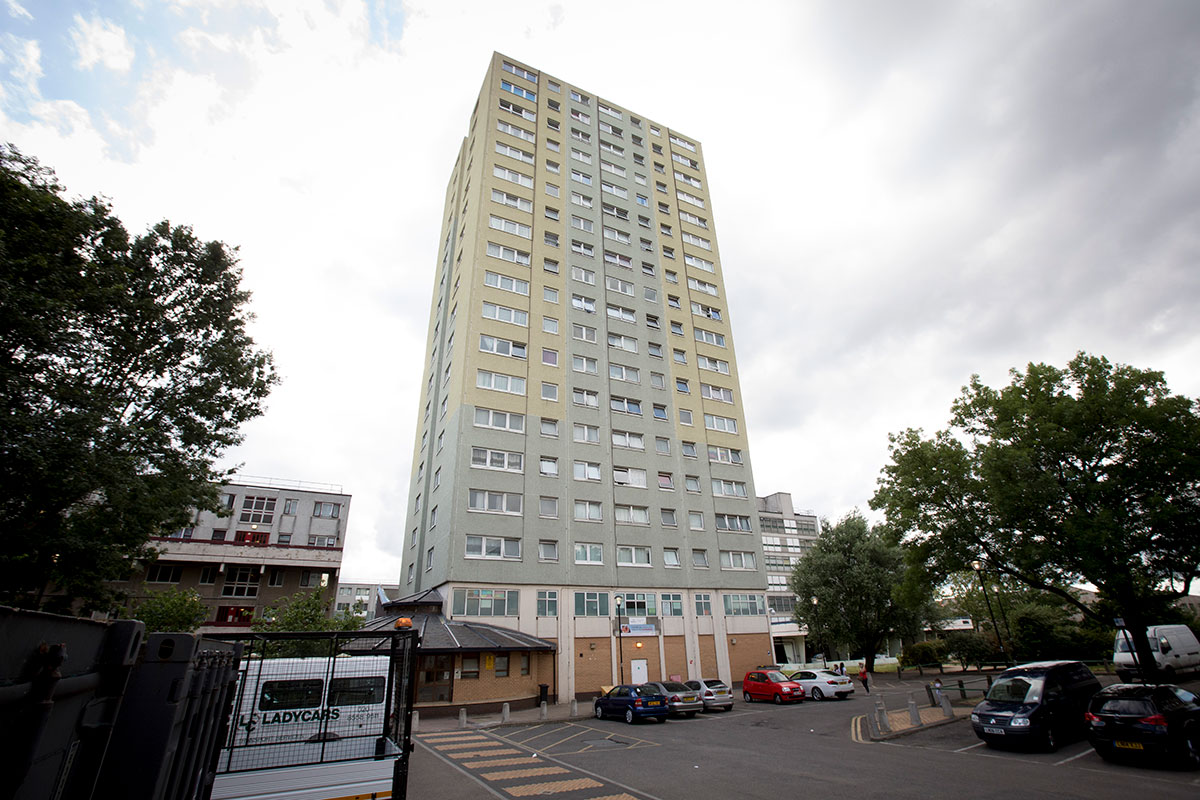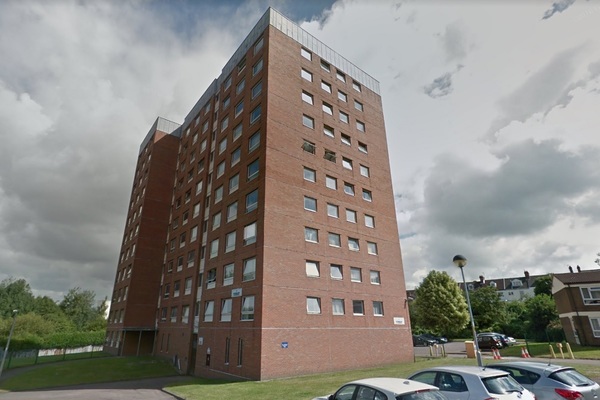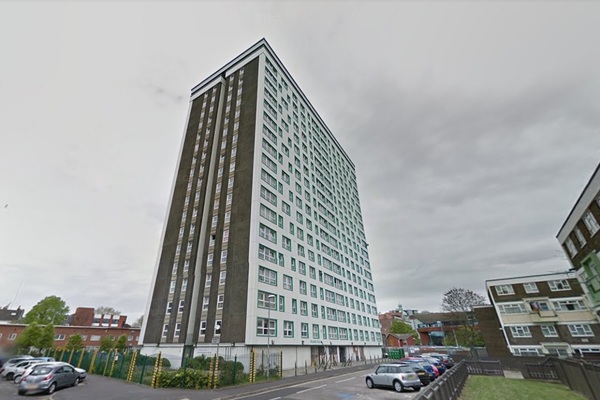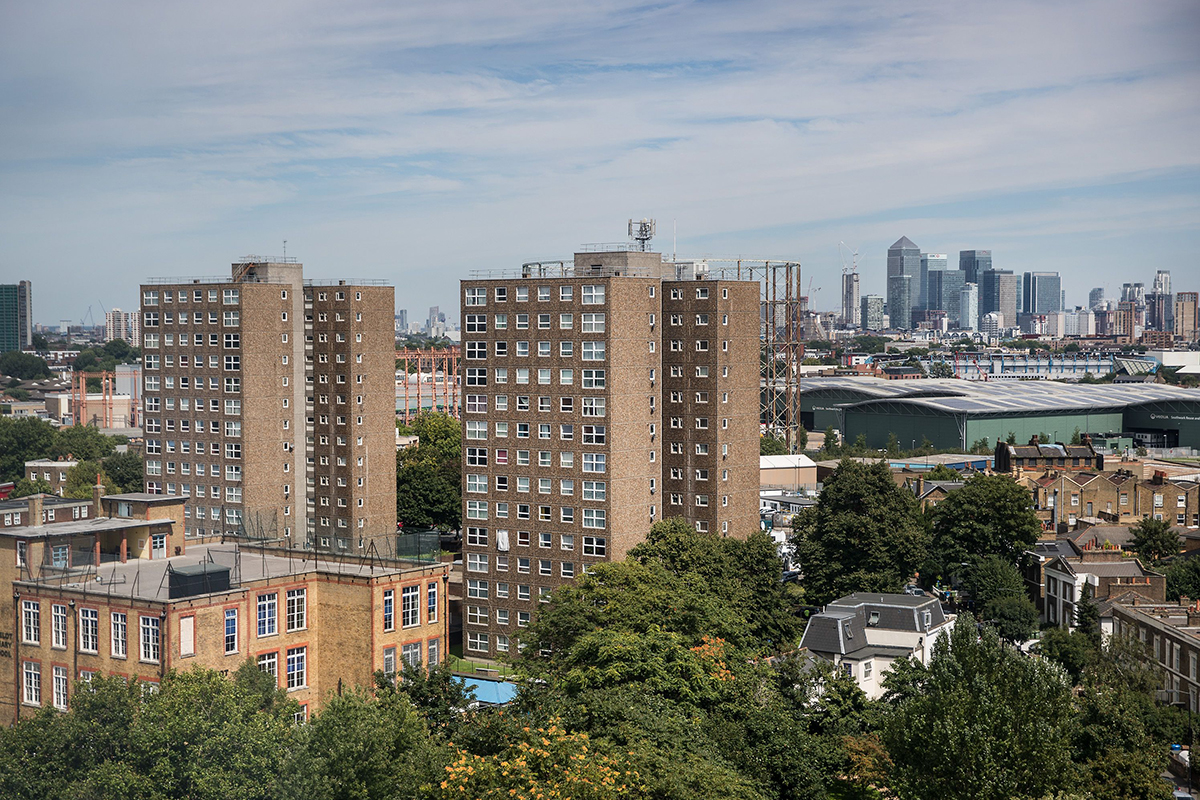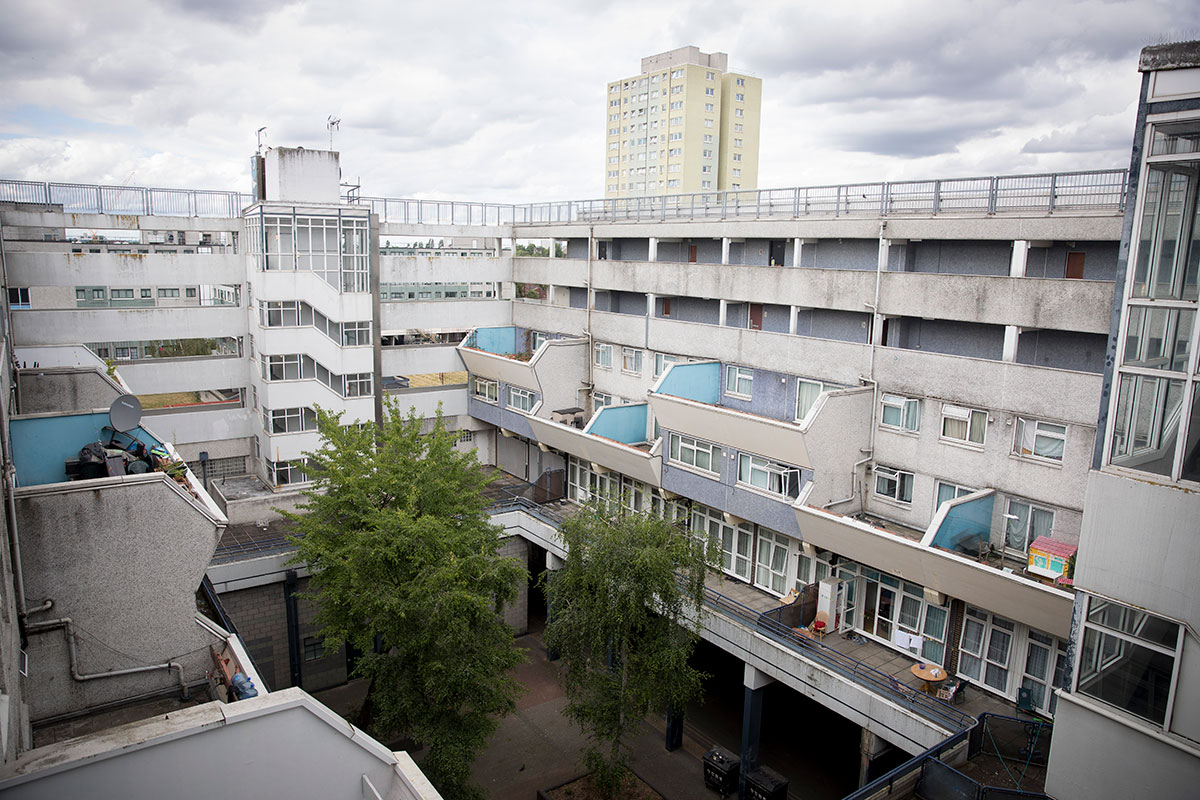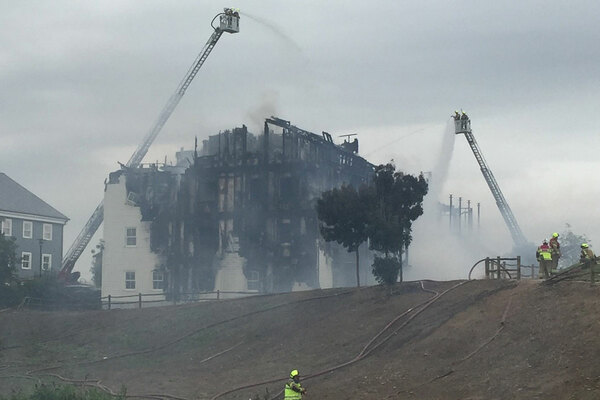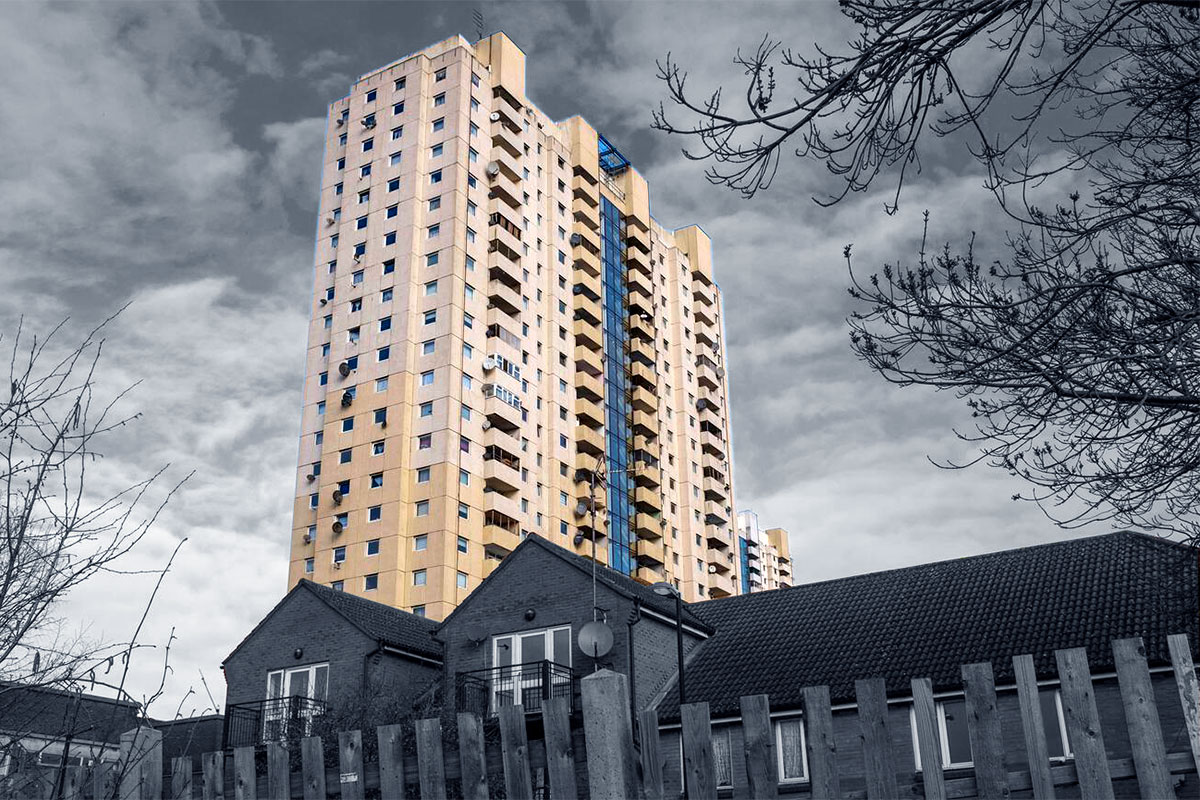You are viewing 1 of your 1 free articles
Broadwater Farm: a large panel system case study
Broadwater Farm, a housing estate with a notorious past, is the latest case study of problems with large panel system buildings. Luke Barratt finds out how residents are affected. Photography by Alicia Canter and Eyevine
The sun beats down on the concrete of the Broadwater Farm Estate in Haringey, north London, when Inside Housing visits. Parents are making the school run, and the first sign that something is amiss comes almost immediately. A young mother with a pushchair in one hand says into her phone: “They’re knocking down two blocks on the estate.”
This decision hasn’t been made yet, but the council has determined that two blocks containing around 250 homes have failed structural tests and are unsafe to live in, and says demolition is preferred.
"The buildings – and their residents – entered a state of limbo where it was not clear how safe they were"
The blocks – 18-storey Northolt (above) and six-storey Tangmere (below) – are both large panel system (LPS) blocks, the same kind of construction as Ronan Point, which partially collapsed in 1968 after a gas explosion, killing four people. This disaster led to a requirement for re-enforcement work on similar towers. But this was not completed everywhere.
In Southwark, four LPS towers on the Ledbury Estate were found to be unsafe last year. They were evacuated and stripped of their gas supply.
In December, it transpired that Broadwater Farm was also affected. All 11 blocks were built with LPS construction. Nine had gas heating and gas cookers, which the council decided could not remain. Cookers were removed but the gas supply was not. The buildings – and their residents – entered a state of limbo where it was not clear how safe they were, or what the next steps would be.
The backdrop to these events was a febrile political climate in Haringey relating to the council’s plans to hand over its housing stock to a new company, the Haringey Development Vehicle (HDV), which would have seen the entire estate knocked down.
Under the glare of the national media, many councillors were deselected, leader Claire Kober stood down and a new Labour council was elected, which some have dubbed the country’s first ‘Corbyn council’.
Under the previous regime, the issue had rumbled on slowly, but in the past couple of weeks, Tangmere and Northolt failed new structural tests, making evacuation necessary. Why, some have questioned, were these issues not detected before?
According to papers submitted to Haringey Council’s cabinet, the gas supplier to the building – Cadent – has said it will turn off the tap for all nine blocks in October, when the council plans to install temporary boilers and then an estate-wide district heating system. Tests have confirmed this will make eight of the blocks safe, but for Tangmere, an unusual building with a ‘ziggurat’ style construction, it won’t be sufficient. According to cabinet papers, the block must either be strengthened or demolished. The same goes for Northolt, which houses a similar number of residents. Tests have determined neither building would be safe in the event of a gas bottle or oxygen cylinder explosion, or a vehicle colliding with the block.
“They’ll say a ballot is for regeneration but they’re moving people out for structural reasons.” - Jacob Secker, Broadwater Farm Residents’ Association
With the gas supply set to be switched off, Tangmere must be evacuated urgently, while Northolt cannot wait much longer. Already, a fierce debate has sprung up about the best way to deal with the situation. Should the blocks be demolished or strengthened? And what is the best way to rehouse the residents?
The HDV saga was a key driver in the wider Labour Party’s adoption of a policy of ballots for estate regeneration, so it is hardly surprising that a central question has become whether or not residents of Broadwater Farm will be balloted on demolition versus refurbishment.
Chris Hutton, chair of the Broadwater Farm Residents’ Association, tells Inside Housing: “We’re fighting for a ballot. Whether we get one or not is a different matter, but we think it’s only fair that we do have one.”
This would not seem unreasonable given the political backdrop. Not only were Haringey Labour councillors the ones who proposed ballots for estate regeneration at last year’s Labour Party conference, but the current crop of councillors have also been elected on a manifesto including that policy. But none of the papers submitted to the cabinet so far mention the ballot, instead referring to a planned consultation with tenants.
Jacob Secker, secretary of the residents’ association, was involved in the campaign against the HDV and clearly is not yet sold on the new council. “They’ve got ways of getting around it, because they’ll say that a ballot is for estate regeneration but they’re moving people out for structural reasons,” he says. “I don’t see the difference at all. You can still have a ballot for different options.”
"Cabinet papers are explicit that the council would prefer to demolish both blocks"
A Labour source, however, tells Inside Housing: “My understanding is that there will be a ballot. I think that has to happen, assuming there was a decision taken to knock the properties down and rebuild them. A lot of Labour Party members and councillors are of the opinion, if we’re going to win the trust of residents, you’ve got to have a ballot, particularly given that it’s the same council that had all the high-profile stuff on the HDV.”
Ballot or not, cabinet papers are explicit that the council would prefer to demolish both blocks. The papers acknowledge that demolition and rebuilding would be more expensive in absolute terms than refurbishment but add that the council’s strained Housing Revenue Account would have to cover the full cost of refurbishment. New build homes, on the other hand, would “likely be eligible for external grant which would reduce the cost to the council”.
Emine Ibrahim, cabinet member for housing, who was a prominent campaigner against the HDV and directly replaced previous cabinet member for housing Alan Strickland in his Noel Park seat, says in the report: “We don’t like the idea of demolishing homes, and would always want to minimise disruption to an estate which many have called home for decades.
The ziggurat-style Tangmere block
“However, we have been elected to deliver on a promise of safe and decent homes. As a council, we also have a duty to maintain the long-term health of the council’s finances, and to consider the direct impact such a cost would have on our ability to maintain the rest of our existing homes, many of which are in desperate need of investment.”
Mr Hutton remarks: “In real terms, it might cost more, but because they might get a bit of money from somewhere else, they want to do it. That’s almost a criminal waste of public money.”
Alan Goodall, 67, who has been a council tenant in Northolt for 30 years, says a ballot is important. He adds: “I’d be inclined to let them refurbish it, with the option to come back. It’s important for me to keep the housing because the chances are, if they demolish, I don’t think they’ll rebuild. Or if they did, would it all be social housing? Would it be part-private, part-buy, part-rent and 10% social housing?”
Even if the blocks are strengthened, residents will still have to be rehoused while the work is done. This has been the centre of another controversy, with some residents objecting to elements of the plan.
The policy originally proposed to cabinet was to move residents temporarily, with the option of making it permanent in the event a resident’s original block is demolished or they wish to stay in their new home. Some residents have complained about how homes will be allocated. The council intends to match each resident’s preference with a specific home and then offer them only that home.
The report reads: “Given the urgency to move tenants, households will only receive one suitable offer which they must not unreasonably refuse.”
Mr Secker, who lives in Tangmere, says the council should follow Southwark’s example and use a choice-based lettings system, allowing residents to choose from several options.
He also suggests that some residents have been given incorrect information. He tells Inside Housing: “I’ve just been to my meeting with my housing officer who’s responsible for my move-on and the information I was given was misleading, because she was implying, ‘don’t worry, we’ll move you to accommodation somewhere else, and then if you want to move on from that – anywhere in the borough – you’ll have that option’.”
Though this was not the policy initially, councillors amended it after pressure from residents, who were protesting outside the meeting. This means that after an initial move, residents will remain on Band A for the purposes of the council’s waiting list.
This means that they will have the option of moving in to a different home if they are unhappy with the first one provided to them by the council, the situation described by that housing officer.
Another resident of Northolt, Grace Tenkorang, says: “If they will send me to a very nice place, I don’t mind staying there until they finish this work. But I don’t want them to take me to a very remote place.”
Ms Tenkorang, like most residents Inside Housing spoke to, understood that safety was the most important concern, but she was worried about where she might be sent and placed great importance on her attachment to the Broadwater Farm community.
Balancing this desire with the need for safety and the allocation of stretched resources is a challenge for any council. But many will be watching with interest to see how the country’s first ‘Corbyn council’ copes with its first dose of real politics.
Update: at 15.40 on 3.7.18 This story was updated to make clear that the council updated its rehousing policy at the cabinet meeting.
